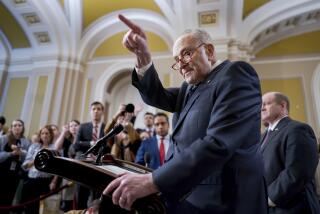A Bit Too Friendly at Doors of U.S.? : Major change proposed in airport customs rules
- Share via
Under a proposed federal plan, travelers entering the United States through Miami International Airport could soon encounter relaxed customs and immigration inspections. They would not be required to reveal where they intended to stay in the States, and they would not have to fill out the forms on which travelers declare what they are bringing into the country.
The changes are part of a pilot program to test a radical federal proposal that could eventually result in no inspections at U.S. airports and an open border between the United States and Canada.
The details of the plan, reported exclusively by Time staff writer H. G. Reza on Sunday, raise the worrisome question of whether safety and security will be compromised in order to facilitate airport operations.
BOON TO AIRLINES: Yes, time-consuming inspections tax the patience and nerves of inspectors, travelers and airlines alike, but the newly disclosed recommendations appear driven too much by corporate economics (airlines complain of their costs when passengers are delayed). The proposal, critics charge, ignores costs that could result from increases in disease, pests and terrorists and other criminals slipping into the United States.
While officials maintain that the proposal is not designed to decrease enforcement, it is hardly reassuring that the officials who conceived it cannot describe the benefits of doing away with the requirement for foreign visitors to give their U.S. address.
Some of the proposals, such as diverting arriving passengers on international flights from “low-risk” countries to domestic gates where passengers and baggage would not be inspected, could prevent U.S. authorities from knowing who entered the United States and in what status. As Sen. Dianne Feinstein (D-Calif.) asked, “What is to stop a potential terrorist from simply flying into the United States from a country designated as a low risk and thereby avoiding customs altogether?”
HUGE CHECKLIST: What’s more, the Customs Service’s own statistics showed that of the 57 million foreign visitors who arrived at U.S. airports last year, the names of fewer than half of them could be checked against the agency’s computerized list of known or suspected terrorists, drug dealers and other undesirables. This is hardly comforting and emphasizes the question of why the recommendations do not focus on how to maintain inspections but make them more efficient, less time-consuming and friendlier to travelers, rather than attempting such substantial change. To simply eliminate inspections does not result in a better system. It could create new problems or open new loopholes that could result in a major expansion of illegal immigration via airports, for example.
The draft plan raises many issues that should have been considered before the pilot program was set. Federal officials should make good on their promise to drop any parts of the plan that hinder enforcement of immigration, drug and customs laws.
More to Read
Sign up for The Wild
We’ll help you find the best places to hike, bike and run, as well as the perfect silent spots for meditation and yoga.
You may occasionally receive promotional content from the Los Angeles Times.






